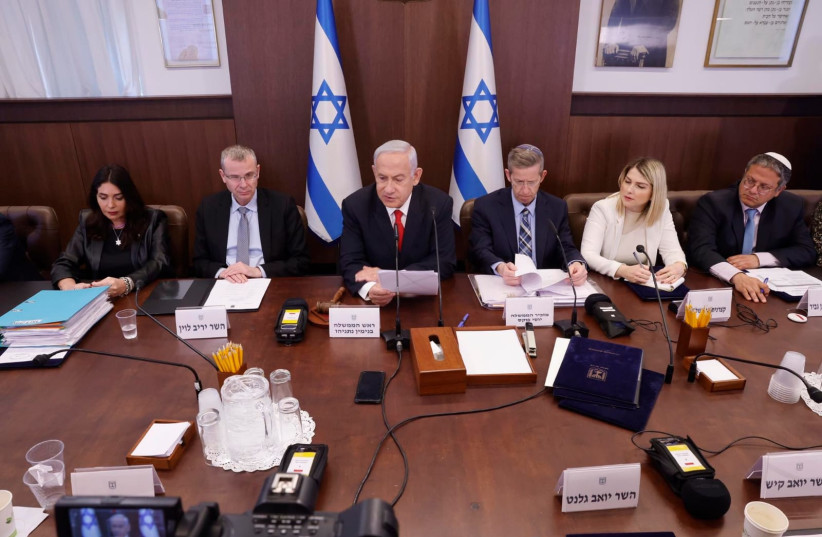Judicial reform negotiations may commence at the president's residence on Tuesday but without preconditions, Justice Minister Yariv Levin, Religious Zionist MK Simcha Rothman, and Finance Minister Bezalel Smotrich said in a joint statement in response to Sunday open letter by major labor associations calling for talks.
"From the first day, we said we were in favor of dialogue in an attempt to reach an understanding on the reform, and at least to reduce the controversy," said the judicial reform leaders on Sunday.
"We believe that reform is essential for democracy, human rights and the economy. We respond to the call for talks without preconditions, and call on others in the opposition to respond to the initiative and attend talks with the president on Tuesday."
Manufacturers Association of Israel Federation of Israeli Chamber of Commerce, Israel Builders Association and the Israeli High-Tech Association issued a call for opposition and coalition leaders to "be brave" and meet at the president's residence for negotiations without preconditions.
"Heads of the Israeli political system, it is your duty to show bravery, to sit around the table together, and advance to a solution that will get us out of the economic and social spiral we've fallen into and could get worse without an agreed solution," said the statement. "End the crisis!"

MK responses were not received well by the opposition
The joint response by Levin, Rothman and Smotrich was not well received by opposition members, decreasing the likelihood that talks would occur on Tuesday.
Yesh Atid decried the coalition statement as misleading, reiterating calls to stop the legislative process before they met at President Isaac Herzog's table.
"On the same day that the members of the failed coalition instead of the state issue a false announcement about negotiations, they bring to the Knesset the override clause, the impairment law and the promotion of a law to appoint a serial criminal as a minister," said Yesh Atid, referring to a bill that had passed revision vote in Rothman's Constitution, Law and Justice Committee, and the bills in the Special Committee for Amendments to Basic Law: Government for a law changing terms for when the prime minister is medically unfit for service and a law preventing the High Court from interfering in ministerial appointments.
Opposition leader Yair Lapid said that if the prime minister wished to make an offer, he should be proposing to cease legislative action and voting.
"Instead of voting we will go to the president's house, we will announce that we're staying there until the State of Israel has a constitution," said Lapid.
Labor leader MK Merav Michaeli said that Prime Minister Benjamin Netanyahu was under pressure by the protests, and that talks would detail the movement.
"I repeat and call on my friends in the opposition - don't negotiate with Netanyahu about our democracy," said Michaeli.
Labor MK Gilad Kariv, a member of the Law Committee, said that the reformist leaders' statement was intended to calm protests until the legislative process was completed by Passover.
"Levin and Rothman continue to close their eyes, call for negotiations while speeding up the legislation, refuse to take seriously the dozens of proposals presented in the committee in the last two months, and refrain from presenting in the Knesset the next steps in the justice minister's plan," said Kariv.
New Hope leader Gideon Sa'ar also dismissed the negotiations as legislation continued, describing the call by Levin and Rothman as a ploy.
The Black Flag movement, one of the leading protest organizations, said that no one would talk to Levin and Rothman without a freeze of the legislative process.
Knesset speaker Amir Ohana welcomed both the initiative and the responsiveness of the coalition.
"I am hopeful that elected officials from all parts of the Knesset will also respond to the initiative, and those who answered in the negative will also think twice. We have no other country," said Ohana.
In a new initiative, an Agreement Tent was set up in front of the High Court of Justice to promote dialogue and broad agreement between the coalition and opposition. The tent was pitched by Ein Prat Academy for Leadership in partnership with several other movements and organizations such as the religious kibbutz movement, The Israeli Congress and Gesher.
"The encampment is established in the name of the Israeli majority that believes in the national existential necessity of forming agreements on the reform of the judicial system," said an Ein Prat statement.
A representative of Ein Prat told The Jerusalem Post that groups were forming for and against the reforms, but not enough seeking a broad agreement. As dozens of youth, religious and secular, engaged in discussions at the site, she said that both sides need to go to "Camp David" referencing past peace talks between Israel and Palestinians. The representative related that they were personally for reform, but the way that it needed to be done was without force – be it force of legislation or protest.
National Unity MK Chili Tropper visited the tent on Sunday as part of the kick-off for a joint letter of MKs including Likud MK Yuli Edelstein calling for negotiations.
The voice in the middle doesn't have to agree, it has to demand dialogue," said Tropper.
